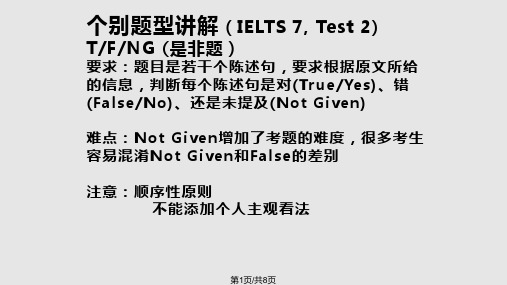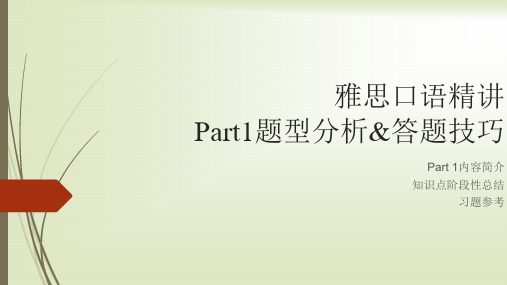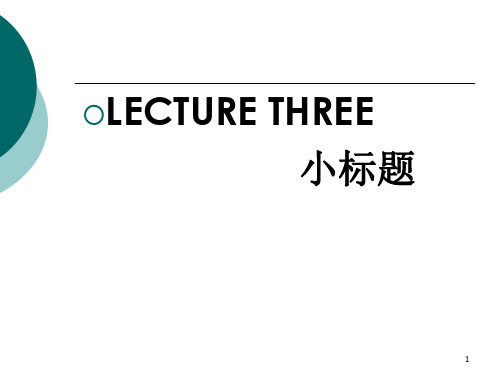1. 雅思精品课程课件学习题目
《雅思阅读配对题》课件

PART 05
雅思阅读配对题备考建议
REPORTING
提高阅读速度,增加词汇量
词汇积累
雅思阅读考试涉及的词汇量比较 大,考生应注重积累词汇,尤其 是学科专业词汇和常见场景词汇 。
阅读训练
通过大量的阅读训练,提高阅读 速度和理解能力,可以选择英文 原版书籍、新闻、杂志等材料进 行阅读。
熟悉不同题型,掌握解题技巧
02
特点:选项数量多,涉及段落内 容广泛,需要考生快速定位并准 确匹配。
配对题在雅思阅读中的重要性
配对题是雅思阅读中常见的题型之一 ,占比相对较高。
正确解答配对题有助于提高整体阅读 成绩,因此掌握解题技巧至关重要。
配对题的解题技巧
01
快速浏览文章,了解文 章主题和结构。
02
仔细阅读选项,划出关 键词,以便快速定位。
题型了解
熟悉雅思阅读考试的各个题型,包括 选择题、填空题、匹配题等,了解不 同题型的解题技巧和注意事项。
解题技巧
针对不同题型,掌握相应的解题技巧 ,如定位、筛选、推断等,提高解题 效率和准确性。
多做真题,提高解题能力
要点一
真题训练
多做历年雅思阅读真题,熟悉考试难度和出题规律,提高 解题能力。
要点二
图表与信息配对
总结词
将图表中的信息与文章内容进行匹配。
详细描述
这种题型要求考生根据文章内容,将图表中的信息与文章中的内容进行匹配。通常,这种题型会给出 多个图表,并列出与之相关的信息,考生需要根据文章内容在图表中找到对应的信息。
PART 03
雅思阅读配对题解题步骤
REPORTING
快速浏览文章,把握文章大意
快速浏览全文,了解文章的主题、结构和主要内容,把握文 章的大意。
雅思阅读课程试讲PPT课件

题目18:Several species of wildlife in the British countryside are declining. 定位:Paragraph B In Britain, for example, many of our best-
loved farmland birds, such as the skylark,
答案:Y
第6页/共8页
Thank You!
第7页/共8页
感谢您的观看!
第8页/共8页
注意:顺序性原则 不能添加个人主观看法
第1页/共8页
解题步骤:
一·仔细阅读题目,找出关键词
二. 定位到原文 1.根据关键词找出对应段落,如专有名词 (年代,人名,地名,数字等),同义词, 词性转换。
2.在该段落找出与题目相关的一句或几句话, 将关键词和其进行对照。
三 阅读原文相关文字,确定正确答案。
答案:N
第5页/共8页
题目21:One of the costs calculated by Professor Pretty was illness caused by food. 定位:Paragraph E TБайду номын сангаасe costs included:£120m for removal of pesticides; £16m for the removal of the bug …… £169m from food poisoning; and £607m from cattle disease.
题目19: The taste of food has deteriorated in recent years.
• 定位: Paragraph C Put it all together and it looks like a battlefield, but consumers rarely make the connection at the dinner table.
雅思口语part1答题技巧课件-原创

What is famous about your hometown?
Criteria评分标准
常见adj替换
6
commonly used adjs:
good---fantastic,fabulous,brilliant,excellent,
beautiful---breathtaking,gorgeous,amazing
interesting---intriguing,amusing,hilarious happy---delighted,overjoyed,pleasant
Exercises:
Do u like rainy days? How does rain affect people's mood? What types of weather do chinese people usually like? Is weather important in traveling ?
知识点阶段性总结
答题思路:表达观点+内容展开 表达观点时常用副词: 语气较强的副词开句:undoubtedly, unquestionably,absolutely, definitely, Obviously, apparently, certainly, surely, etc. 语气较平缓的副词开句:normally,actually, generally, frankly, honestly, basically, theoretically, technically, currently, and etc. 表达观点时常用词组: in my opinion, from my point of view, in my view, from my perspective,etc. 句首可用的词组:as a matter of fact , off the top of my head, as far as i'm concerned , 展开技巧: 举例子、列原因、表达感受
雅思听力精华课件-选择题

24. Dr描述是: A unlike others B beautiful C cold
25. Why cold? A shape B frozen sea C dry
26 Why part of a continent? A done research B geological evidence C colse to SA
22. Role is: A expedition,equipment B researcher,financial assistance C internation
23. Purpose of VC: A accommodation 住 B training 培训 C show what is like展示
8-3-3
21 What is original work? A construction B agriculture C tourism
22 Why change? A not organized B boring C physically demanding
23 Important of village? A respect family life B develop trust C use money wisely
24 Important of village? A respect family life B develop trust C use money wisely
25 project manager? A let paul do most work B ambititous C supportive
Cam10 P14
S3 当务之急 将题目简化!
简化的原则:
1 题目重要于选项: 2 排除三个选项中“同类别词” 2 名词为主(非名词为辅) Why in Christchurch? A member, A T成员 B position位置 C climate气候
雅思听力题型 ppt课件

2
精品资料
• 你怎么称呼老师?
• 如果老师最后没有总结一节课的重点的难点,你 是否会认为老师的教学方法需要改进?
• 你所经历的课堂,是讲座式还是讨论式? • 教师的教鞭
• “不怕太阳晒,也不怕那风雨狂,只怕先生骂我 笨,没有学问无颜见爹娘 ……”
• “太阳当空照,花儿对我笑,小鸟说早早早……”
2021/3/30
• Form / Notes / Table / Flow-chart / Summary Completion (个人信息表、笔记填空、分类比较表、流程图、小结完成填空)
• Multiple Choice (选择题) • Short-answer Questions (简答题) • Sentence Completion (单句补全填空题) • Labeling a Diagram / Plan / Map (图解标签题) • Classification (分类联系题) • Matching (配对题)
眼睛扫描选项。 4. 实在听不懂,则当阅读题做,找题干和选项之间的同义关系。
2021/3/30
ppt课件
19
单选题(Multiple Choice)
1. 快速扫描题干,不看选项,划出题干中核心词。 2. 录音开始后,再扫描题干核心词,并依次扫描选项,比较选项之 间的相同与不同。 3. 一些常见做题原则: (1) 顺序原则:三个选项都出现过,最后一个提到的是正确答案 (2) 最近原则:选项中没有和原文完全符合的,找出最接近的那个 (3) 同质相斥原则 (4) 常识原则 (5) 不要选择太绝对性的判断
eg. sit down; snack bar; bike key; upside down 有时后一单词词首不一定是爆破音, 而是其它的辅音, 也可以造成前 一单词词尾爆破音的失掉. eg. Good night; contact lens
雅思听力题型 (课堂PPT)

场景词汇 ➢一、雅雅思思听听力力概概述述
雅思听力概述
3、听力4部分:
Section1和2为生活英语(survival English);
Section3,4部分为学术英语(academic English),可能是instruction, lecture etc.
场景词汇
雅思听力考试题型
1、表格 题 2、选择题
• Section 1 是保分, Section 2 & 3 是争分, Section 4 则是挑战
场景词汇 ➢一、雅思听力概述
雅思听力考试五大原则 1、核心词定位原则:名词+动词(形容词)
2、顺序原则:出题顺序=行文顺序 3、常识原则:不考偏怪题,有时可推测
4、听即所得原则:听到的才是答案 5、边听边选原则:听完也选完
地点,内容,注意事项。
新生入学
选课 论文/研究 授课
向新生介绍学校设施,服务机构,办学 历史,选课情况,注意事项,如何注册, 应该做什么,不应该做什么等。
课程名称,课程安排,语言选择,选择 级别,选课时间,日期及申请人。
考查存在问题,调查方法,研究成果及 不足。
教授开授讲座(时间,日期,内容,主 讲人名字);学生做论文专题。
场景词汇
租金账单:
租 房
Rent(租金),deposit(押金), telephone bill(话费),
场 gas/water/electricity/power bill
景
房子位置:
Downtown(city center),urban(市区), countryside等
场景词汇
实战演练
《剑4》Test3 section1
场景词汇
雅思各类介绍PPT课件

雅思阅读 标题 heading(课堂PPT)

Method 1: 查找 topic sentence
1. read the 1st, 2nd and last sentence of every paragraph to find the topic sentence
2. check which heading corresponds with the topic sentence
a can opener on one counter. I have a microwave oven on another. In my cupboard, you can find a mixer and a hot air popcorn popper. On the far side of the kitchen, there is a coffee machine and coffee grinder. Heading 4 kitchen utensils
5
Follow the following procedure
List of Headings The 1st, 2nd &
the Last Sentences Topic Sentence Main Idea
Most suitable Heading
6
III 主题句与支持句练习
In a growing number of hotels and skyscrapers across the nation, steel walls have replaced the foot-thick brick and mortar walls once used. Tests show that a steel wall four inches thick has better insulating qualities than a 12-inch thickness of masonry. In addition, steel-curtain wall panels save both time and labor. And the floor space conserves red by use of the thin wall as against the thick wall in a big office building can mean a couple of hundred dollars a year in rentals.
- 1、下载文档前请自行甄别文档内容的完整性,平台不提供额外的编辑、内容补充、找答案等附加服务。
- 2、"仅部分预览"的文档,不可在线预览部分如存在完整性等问题,可反馈申请退款(可完整预览的文档不适用该条件!)。
- 3、如文档侵犯您的权益,请联系客服反馈,我们会尽快为您处理(人工客服工作时间:9:00-18:30)。
学习类考题第一部分:●General Description of Your Studies⏹Are you working or studying?⏹What subject(s) are you studying?⏹Have you always wanted to study _____ (your subject)?●School/University⏹What school (or university) do you go to?⏹Why did you choose that university (or, school)?●Liking/Disliking Your Studies⏹How do you like your subject?⏹What are your favorite classes/courses/subjects at university/school?●Easy and Difficult⏹What's the most difficult part of your course?⏹What's the most interesting part of your course (your subject)?●Specific Course Content⏹How do students in your course learn this subject?⏹Do you think (all of) those subjects are useful to you?⏹How do you think you could improve your study efficiency?●Studying with Others⏹Do you prefer studying independently ( = studying alone) or with others (or, in a group)?(Why?)●Future Work/studies⏹How do you plan to get that job (or, that kind of work)?⏹Do you think it will be easy to find that kind of work?⏹Why are you taking the IELTS test?⏹What country would you like to go to for further study? (Why?)⏹Do you think it will be easy to find that kind of work?●Your First Day at University (or high school)⏹Do you like your life at university? (Past tense if you have graduated)⏹Did you like your first day at university?⏹Do you think the first day at university is important?⏹How important do you think it is for people to have an enjoyable first day at university(or, school)?●Your Relationship with Your Classmates⏹In what ways (or, how) do you associate with your classmates●Reading:⏹Do you like reading?⏹What (sorts of books) do you like to read?⏹How much time each day do you spend reading?⏹Did you read much when you were a child?⏹For children, what are the benefits of reading?⏹What books (or, what things) have you read recently?●Languages⏹What language do you usually speak?⏹What foreign languages have you studied?⏹Why did you choose to study that language?⏹How did you learn that language?⏹Would you say it's a difficult language to learn?⏹How long have you been learning that language?⏹What language would you like to learn, (if you had the opportunity)? (Why?)第二部分:●Course⏹Do you think teachers are useful (or, necessary; or, important)? (Why?/Why not?)⏹What (personal) qualities do you think teachers should have?⏹Do you think teachers and students should be friends with each other?⏹Do you think school lessons and teachers are necessary for successful learning?⏹Do you think schools should only teach skills for working or should they teach morethan that?⏹What are the most popular courses (= subjects; majors) that people study today (atuniversity or other tertiary educational institutes) in China? (Why?)⏹How have the choices that Chinese students make on what to study changed over thepast few decades?⏹Do you agree or disagree that universities should only have courses that prepare thestudents for jobs?⏹Which do you think is more useful (or, important), studying a course in a classroom orgetting practical work experience? (Why?)⏹Do you think high schools and universities should include more opportunities forgaining practical experience? (Why? How? / Why not?)⏹Do you think there is a need for companies to train some people in the use of foreignlanguages?⏹What are some differences between old and young people learning (or studying)something?⏹What do you think is the role played by the Internet in education nowadays?●Advice:⏹Would you say young people (or, children) are usually willing to accept the advice ofolder people?⏹Why do so many young people not accept (or, not follow) the advice of older people?⏹What do you think is the main difference between older people and young peoplewhen someone gives them advice?⏹Some people find it easier to accept advice than other people do. Why do you thinkthere is this difference?⏹What kinds of advice do you think are/would be most useful for young people?⏹Do people around you listen to (or accept) your advice?⏹How important do you think it is for these advice givers to be trained (qualified) to giveadvice?⏹If you realized that someone was giving you some bad (or, erroneous) advice, whatwould you do?●Skill:⏹What kinds of skills do you think are the most useful (in everyday life)?⏹Compare the skills women learn with those that men learn.⏹Do you think high school students should learn skills that will be useful in theworkplace?●Happy:⏹Do you think people who have more talent are happier than others? (Why?/Why not?)⏹Do you think money makes people happy?⏹Are the things (the events, the circumstances) that make people happy today the sameas what made people happy several decades ago?⏹Why do people feel happy when they are with members of their family?⏹In general, what do you think makes a happy family?●Libraries⏹What is the purpose or role of libraries in society?⏹What information can people get from libraries?⏹Do children (or, young people) and adults (or, old people) use libraries in the same way?⏹What benefits can old people get from using community libraries?⏹How do you think libraries could attract more people?⏹Can you suggest some ways to make a library (more) attractive for old people/teenagers and young people?⏹How do people find a particular book (or other material) in a library?⏹What skills (and knowledge) do you think library staff should have?⏹In the future, do you think people will use the internet instead of going to libraries?●Reading:⏹Do Chinese people have much time to read books?⏹What do children like to read?⏹Do men and women have the same tastes in books (or, reading materials)?⏹Do you think books are only for relaxation (or, entertainment)?⏹Do you prefer reading books or watching TV?⏹Do you know of any books that have been made into films?⏹In what ways is a book different to the film (or TV) version of the book?⏹Why do you think foreign books are becoming more popular all over the world?⏹How do you think adults can encourage children to be interested in reading?⏹Do you think parents should teach their children how to read before the children startgoing to school?⏹How can parents help their children to read?education system:●difference between western education system and Chinese(problems):⏹focus more on written tests and marks instead of practical skills⏹teaching methods is less various than western, for example, we hardly usepresentation in high school, students usually neglect the importance of research.⏹spend less time on extracurricular courses and physical exerciseHome education vs School education:●Home education: 不好: lack of the chance to cooperate & share with others; lesscompetition opportunities; group discussion; high requirement for parents educationbackground好: independent thinking; problem solving ability: make own plan; nodiscipline, free, be creative; more balanced in life and study●School education: 不好: too many students in one class, can’t gain the full attentionfrom teacher; too tight schedule, always do homework to pass the test; always listen toteachers guide, and lack of independent thinking; 好: learn to be a team player,communicate, compromise, persuadeSmall class vs Big class:●Small class: got more concerns from teacher; more opportunities for discussion andexperiment; much easier to do activities; more questions and answersReal class vs Virtual class:●Real class: easier to tell views out; quick response; see peopl e’s facial expression clearly;group discussion●Virtual class: save time, free: eat food, sit more comfortably, can’t avoid internetaccidents, free schedule,。
